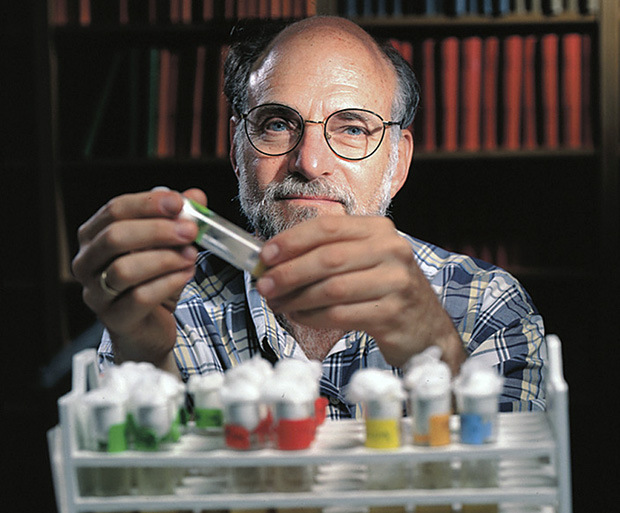Faculty Focus: Michael Rosbash, biologist
Director of the Brandeis National Center for Behavioral Genomics talks about circadian rhythms
 Photo/Copyright © Stanley Rowin
Photo/Copyright © Stanley RowinBiologist Michael Rosbash, director of the Brandeis National Center for Behavioral Genomics
Biologist Michael Rosbash, director of the Brandeis National Center for Behavioral Genomics, was recently awarded the 2011 Louisa Gross Horowitz Prize from Columbia University for groundbreaking studies on the molecular basis of circadian rhythms. He shares the prize with Michael W. Young of Rockefeller University and Professor Emeritus Jeffrey Hall of Brandeis. It is said to be the first demonstration of molecular mechanism for behavior. Their research began with cloning the gene named “period,” which is needed to maintain circadian rhythms in the brain of the fruit fly Drosophila melanogaster.
Rosbash originally began studying gene expression, including RNA processing, in yeast when he arrived at Brandeis. Nearly a decade later, in the mid-1980s, he began his collaboration with Hall. We sat down with Rosbash to learn more about his research with circadian rhythms and their importance.

BrandeisNow: You’re an expert on Drosophila, the fruit fly, and its circadian rhythms. What are circadian rhythms and why are they important to understand?
Michael Rosbash: Circadian rhythms are daily oscillations in just about everything that one can measure, reflecting a clock that governs everything, such as daily hormones, appetite and the sleep/wake cycle. Every single physiological function is under clock control. Attention, libido, you name it. More and more diseases are also suspected of being associated with circadian rhythm abnormalities.
What happens when circadian rhythms go awry?
In humans this is best understood in sleep disorders. And when I say disorder, this is not necessarily an illness or a mutant family mutation, but a syndrome. There are early birds and night owls, for instance. People who fall asleep very early and then wake up very early, or people who can’t fall asleep until too far into the morning. Most of those are suspected of being due to circadian abnormalities - the clock is running funny.
You cloned several clock genes, which apply to humans. What is a clock gene is and why is it important to understand?
Everything in biology has a genetic underpinning. Proteins run the show, and are the products of genes — from vision to kidney function to skin to heart function to brain function. We were using genetics as an inroad into the mysterious process of circadian rhythms and specifically in fruit flies, in Drosophila, because it’s a very facile genetic organism. We knew that fruit flies had clocks, but nobody had any idea what they consisted of. We cloned the genes in order to get our hands on the machine, on the gears of the clock, and that turned out to be true. We were doubly lucky because we weren’t working on humans, and it turned out that the same genes and same proteins govern the clocks in mammals, and specifically in humans. So that was just a piece of luck.
What did you know at the beginning of your career, what do you know now, and what do you hope to accomplish?
I was a chemistry major and worked on nucleic acids. Then I did molecular biology. I came to Brandeis in 1974. My interest was in gene expression with yeast. One of the lessons of my career has been to collaborate with your friends and colleagues. I picked up fruit flies from Jeff Hall and other colleagues here. They were working on Drosophila and I suggested working together; we had complementary skills. I picked up Drosophila and then picked up behavior in two separate steps, which is how I learned about circadian rhythms. More recently I’ve become interested in sleep.
As far as what I’d like to accomplish, I’d like to finish understanding the nuts and bolts of circadian timekeeping. I’d also like to understand sleep as a process, and not just its relationship to circadian rhythms. Yes, sleep is regulated in part by the circadian clock, but also more broadly. What is sleep for? What’s the function of sleep? It turns out that fruit flies are pretty good for this, too, because they sleep. Not exactly like we do, but enough to be a good experimental model to explore that problem.
How might your research play a role in the development and treatment of sleep disorders?
The “how” of sleep is sort of the molecules — it’s what’s analogous to the gears of the circadian clock. And the “why” of sleep is the more broad and philosophical question of its function. If you knew something about all of these, the “hows” and the “whys,” I think one will be able to make some inroads into the problems of sleep disorders. It’s a major issue with aging — in other words, for everybody, sleeps gets worse with age, and the lack of sleep is a major health hazard which results in all sorts of negative physiological consequences. It’s probably a bigger contribution to car accidents than alcohol, because the sleep — deprived have poor attention and reactions. It’s a major health problem for the United States and for the world at large. So it’s gratifying to be able to make a contribution to that.
Rosbash is an Investigator of the Howard Hughes Medical Institute and a member of the American Academy of Arts & Sciences and the National Academy of Sciences.
Categories: Research, Science and Technology





